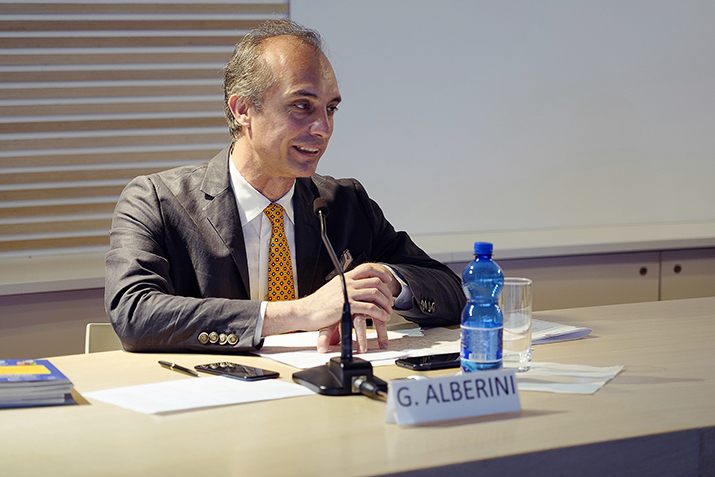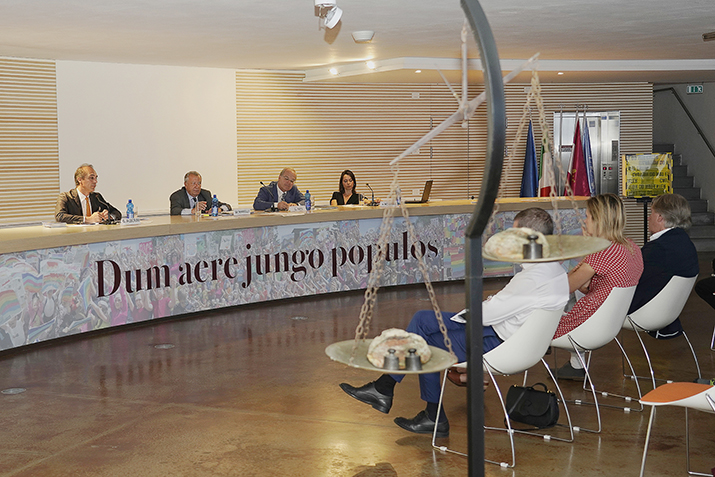GIANLUCA ALBERINI
We are all witness to what is happening in Ukraine, but not only: there are still many conflicts in the world, a pandemic and an environmental crisis but now also a food and energy crisis. All of this is a source of widespread insecurity and instability. An international "disorder" seems to have replaced the international order. In the face of a significant loss of people and citizens the demand is growing for reference points in relation to who should do what.
Almost always, when we are confronted with serious crises like those now mentioned, we turn to the UN. One often wonders what it does but above all, what it should do, for example in the case of the war in Ukraine. It is not my intention to dwell on a lesson in international law, especially in the company of professors with considerable expertise on the subject. However, I would like to focus on a number of historical passages so as to have a better understanding of the United Nations, of what it is today and perhaps, also try to understand its future.
When the UN does not respond, it is because the complex mechanisms that move the organization have been brought to a halt
One could start from the very name, "United Nations", which in the beginning indicated the States which fought the Powers of the Tripartite Pact (Germany, Japan and Italy) during the Second World War. The same countries had pledged to accept the principles decreed in the Atlantic Charter (conceived by US President Roosvelt and British Prime Minister Churchill), which stated: « All the nations of the world, for realistic as well as spiritual reasons, must come to the abandonment of the use of force».
The application of this principle had already been attempted with the forerunner of the UN, the League of Nations, born on the impulse of another American President, Wilson, in 1919 - when he elaborated the famous 14 Points. Even then, after the First World War, efforts were made to guarantee international peace and security by preventing conflicts and promoting economic and social progress. This objective, as we know, failed for various reasons with the outbreak of the Second World War. Yet the League of Nations had introduced a fundamental principle: all states could join together, on an equal basis. The principle of sovereign equality between states was beginning to take hold.
The United Nations Charter, which came into being in 1945, solemnly reaffirmed this in its second article. The fundamental purposes of the Charter and of the United Nations Organization were - and still are today - the maintenance of international peace and security on the basis of equality between states, as well as the development of nations in economic, social and cultural spheres.
These concepts are not taken for granted, even if today it might seem so.
Another fundamental characteristic of the UN is that it is an international organization in all respects: it is a legal entity that acts in its own name and in accordance with the rules established in the United Nations Charter and further still in their subsequent application.
In the face of violations such as that of Russia, the Council should provide answers, yet it is incapable of doing so
The internal structure of the UN is complex, but the two main bodies are the General Assembly and the Security Council. Essentially, we are dealing respectively with a Parliament and an Executive on a global scale. All Member States have a seat in the Assembly, with the same powers regardless of size or prominence be it political, economic or other. A vote from the United States or Italy formally has the same value as that of Liechtenstein or Nauru. Here the principle of equality between states is at its most accomplished.
The Security Council, on the other hand, is a small body: only 15 out of its 193 members may be a part of it. As we know, five (the United States, United Kingdom, France, Russia and China) are permanent members, while the remaining 10 rotate every two years following the elections that take place in the General Assembly. It is evident here that the principle of equality leaves room for other considerations, particularly if we bear in mind that the five permanent members have the right of veto and that the Council has exclusive authority in responding to threats and / or violations of the international peace. In these situations, the Council is often said to be the police officer who intervenes to identify and condemn the transgressors of the rules of peaceful coexistence between States.
One immediately perceives how equality between states is in actual fact a flexible principle, so to speak. Moreover, it is necessary to find an effective synthesis of the interests and opinions of 193 States which are often very different from each other.
Allow me here to draw a parallel with our Constitution which upholds formal equality, but also substantive equality, of citizens before the law, without distinction.
It is acknowledged that some citizens face more obstacles than others, and these obstacles must be removed with specific laws and measures. This discourse can be repeated in our sphere and in relations between states. Although formally all states are the same, it is evident that some have more power than others and at the same time certain states, those referred to as "developing", have special needs.
Italy proposes the creation of new seats in the Security Council to be assigned to regional groups
Paradoxically, therefore, this disparity can go in two ways and the direction in which it goes depends on us and the delicate mechanisms developed with the UN.
The 2030 Agenda for Sustainable Development is one of the examples of this acknowledgement and commitment to guarantee not only formal but above all substantive equality between States, aware that this also implies equality between people and populations. It is certainly not easy to accomplish these objectives, also because there is less and less time. However, this is a path, of a global nature, capable of providing a broad vision and stimulating the states, perceived not only as governments but civil society as a whole.
In my opinion, this is one of the UN's prevalent strengths: despite the fact that the world has radically changed since 1945, it still remains the only world forum in which to discuss any global issue and strive to find shared solutions. Today the need is felt more and more, we require answers that often a single government cannot provide. When the UN does not respond, it is because the complex mechanisms that move the organization have been brought to a halt.
This is why it is fair to ask what works and what doesn't. The use of the veto, the rotation mechanism in the Security Council and the very division of duties between the organs of the United Nations are all topics on the agenda. It is obvious that, in the face of evident violations of international peace such as that by Russia, the Council should provide answers, yet it is incapable of doing so.
In truth, there was no lack of alternative initiatives, first and foremost by the General Assembly. Three resolutions were passed condemning the Russian aggression and, following the initial proposal of Liechtenstein that I mentioned earlier, it was decided that every time a veto blocks the Security Council, the Assembly must meet within the following 10 days to discuss it. This is an important response and one that highlights the possibility of finding alternatives in the event of a political stalemate.
In the Human Rights Council, another important UN body, other measures have been taken. The International Criminal Court (which investigates crimes committed by individuals) and the International Court of Justice (for disputes between states) are also active in relation to the Ukrainian crisis. Their initiatives focus on accountability, as a reminder that no one can escape what is referred to as a rule-based international order. They remind us also, that no unilateral action, according to the logic of force, can ever lead to the peace and stability to which the United Nations aspires.
It is therefore important that the international community responds effectively. In this sense, it is right to ask ourselves how to reform the United Nations and above all the Security Council. Italy is the reference point for a very diverse group of states (called <em>Uniting for Consensus</em>), which supports an intermediate approach, in favour of a Security Council that is more representative, democratic, accountable, transparent and effective. We therefore propose the creation of new long-term seats (more than the current two years) to be assigned to regional groups rather than to individual countries, also with the possibility of immediate re-election. In this way, countries that would like to commit themselves more, and currently aspire to a permanent seat (perhaps with a veto) such as Germany, Japan, India or Brazil, could obtain a more continuous presence in the Council, while also guaranteeing all the other States greater possibilities of participation.
The reform of the veto power is one of the most delicate issues, also because it requires the consent of all five permanent members. However, there are initiatives to hold permanent members accountable and ensure that the power of veto is not abused.
Article 27 of the United Nations Charter states that in the event of international disputes, the parties involved must abstain from voting in the Council, but this does not apply to threats to international peace and security, that is to say, in the most important cases. France and Mexico have long launched an initiative to pledge permanent members not to use vetoes in the event of mass atrocities and war crimes.
Any reform must in any case be comprehensive and well thought out so as to take into account all aspects (such as the working methods and the relations of the Council itself with the General Assembly) and above all there should be a broad consensus among all the States.
For this we are open to dialogue and confrontation with other proposals. Not to mention the considerations on the opportunity of a seat for the European Union, which would constitute a great step forward for the integration process, but which would also require strong political will and unity.
To conclude, as I mentioned, formal equality between states does not always go hand in hand with substantive equality.
For this reason, the UN needs support both internally and externally, as an international institution of reference for discussing and striving to solve the problems of the world.
Respect for the rules and institutions of international law is one of the defences in place against anarchy and survival of the fittest.
This is why Italy supports the United Nations as a pillar of its foreign policy and continues to propose constructive, ambitious yet realistic solutions to contribute to international peace and stability.
Any reform must be comprehensive and well thought out








